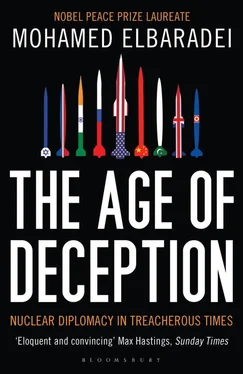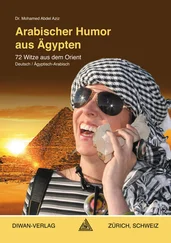I began to draft an agreement to that effect, but Poneman called to say that Obama was “very uncomfortable” with any agreement that would keep the nuclear material in Iran. They were ready for any other creative solution, including making the United States the sole party to the agreement, as Salehi had earlier proposed. They also suggested storing the uranium in a third country, such as Turkey or Kazakhstan, where Iran would have complete trust in the host.
I checked in with Salehi. Unfortunately, domestic politics had once again shifted. The United States as the sole party to the agreement would no longer be sufficient. The bottom line was that the LEU had to stay physically in Iran until it was time for the swap.
We were watching the brightest of opportunities sink into the mire of domestic politics in both Washington and Tehran.
Salehi rang on November 5 to say that he had been asked by President Ahmadinejad to see Khamenei to discuss the fuel agreement. Salehi was surprised; he had expected the Iranian president to make the decision himself. The Supreme Leader told Salehi that the international treatment of Iran’s request for fuel for its research reactor was becoming an indignity. Iran, he said, would deliver the LEU as a swap, but only in batches of four hundred kilograms, and only upon receipt of the fuel.
Only days earlier, Hillary Clinton had insisted in the media that the deal would not be changed, [26] “US Will Not Alter Iran Nuclear Deal,” Al Jazeera, November 3, 2009.
which upset the Iranians even as they acknowledged Obama’s more conciliatory and friendly statements. Salehi was dejected. Even the idea of storage at Kish Island was no longer on the table. Khamenei’s last response was “the final word.” This new condition would not fly, I told Salehi. He knew that and asked me to urge the Americans to be patient.
In an interview with Christiane Amanpour, I attempted to put subtle pressure on the Iranians, urging them to look at the big picture and suggesting the idea of Turkey as a third country where the LEU could be stationed. I called Poneman after the interview, to let him know the latest. He called back shortly thereafter to say that Obama was comfortable with Turkey and Turkish prime minister Erdoğan taking this role. Salehi meanwhile had discussed the option with Ahmadinejad, who in turn had briefed Khamenei. Through the Turkish ambassador, I sent word for Erdoğan to speak to Ahmadinejad about the idea during the latter’s upcoming trip to Turkey.
My final visit to the United States as IAEA Director General was like nothing I had experienced there in the past eight years. In Washington, I met with an exhausting lineup: James Jones, the national security adviser and his team; Hillary Clinton and her team; the Senate Foreign Relations Committee, chaired by Senator Kerry; and many other officials from the Department of Energy and the State Department. Wherever I turned, I found expressions of thanks. I had come back home to the United States I knew. It was a good conclusion.
In New York, I delivered my final address to an appreciative General Assembly. It was hard not to recall the vociferous criticisms that had not so long ago been leveled at me for partiality and the old chestnut, speaking outside of my box. But for all the sweetness and gratification of this conclusion to my tenure, the unraveling possibilities of rapprochement with Iran weighed heavily on my mind. We had come very close.
The Iranian fuel proposal did not die when I left office, continuing instead to take its twists and turns. On February 9, 2010, the Iranians declared they would begin enriching LEU up to 20 percent to provide the fuel for their research reactor. Two days later, Ahmadinejad rather inexplicably declared that Iran had become “a nuclear state.” By mid-month, IAEA inspectors verified that Iran was enriching uranium to 19.8 percent in Natanz.
But a more positive development was evolving behind the scenes. After several months’ delay, Tehran was warming to the suggestion of a fuel swap that would feature interim storage of Iran’s LEU in Turkey. In April, Obama wrote directly to Brazilian president Lula da Silva—in a letter that was later leaked to the press—urging that any fuel swap include the measure of storing the fuel “in escrow” in Turkey. I remained in occasional contact with the foreign ministers of Brazil and Turkey, fully supporting this new arrangement.
On May 17, 2010, in a joint declaration, Iran, Brazil, and Turkey announced they had reached an agreement on a fuel swap. Iran would send twelve hundred kilograms of LEU to Turkey, in a single shipment, to be held in escrow while Iran’s research reactor fuel was being fabricated. It was a leap forward—particularly because it signaled the willingness of new players, Turkey and Brazil, to take an active role in resolving the diplomatic impasse.
But the very next day, in a masterstroke of diplomatic futility, the P-5+1 announced that they had reached agreement on a fourth Security Council resolution to escalate sanctions on Iran for not bringing its enrichment program to a halt. Hillary Clinton called the fuel swap deal with Turkey and Brazil a “transparent ploy” on Iran’s part to avoid new sanctions.
I was dumbstruck and, to say the least, grievously disappointed. Once again, as I noted in an interview with Jornal do Brasil , the West had refused to take yes for an answer. [27] “ElBaradei Slams West’s Rejection of the Iran-Turkey-Brazil Deal,” Jornal do Brasil, June 3, 2010. English transcript retrieved at www.campaigniran.org/casmii/index.php?q=node/10263 .
Brazil and Turkey were outraged. Ahmadinejad urged the United States to accept the fuel swap as a move toward openness and dialogue. At the Security Council, Brazil voted against the sanctions—to no avail. The Western powers once more had touched a solution with their fingertips, only to brush it away.
When I had first proposed the fuel swap, Iran had produced about fifteen hundred kilograms of enriched uranium, so the agreement would have removed most of Iran’s inventory from the country. By the time of the agreement with Turkey and Brazil, the stock had risen to about twenty-five hundred kilograms, which of course made the agreement less attractive to the Americans as a diplomatic point of entry, since Iran would be retaining a “significant quantity.” Iran also had not committed, in the agreement, to stop enriching to 20 percent, although Ahmadinejad had hinted that they would do so.
The Western powers were not happy about these aspects of the deal, but it was obvious to me that they could easily and successfully have addressed these issues in the early stages of negotiation. It was incomprehensible and somewhat naïve to ask Iran—or any country, for that matter—to give up everything before the start of talks and expect a positive response. But the pattern was familiar: nothing would satisfy, short of Iran coming to the table completely undressed.
CONCLUSION:
THE QUEST FOR HUMAN SECURITY
The yearning for security is a universal human quality. But for nations as for individuals, the definition of security and the strategies for how to attain it vary greatly, whether the quest is to secure food, water, health care, or freedom from want—or other basic human rights (freedom of expression, freedom of worship, freedom from fear). To nations, security might mean the achievement of economic, military, or ideological dominance, or the projection of power and influence. In too many regions of the world, long-standing tensions block the path to security, and the quest to attain it must begin with their resolution.
Despite this range, it would be a mistake to think of global insecurities as disconnected. Repeatedly, we see the links: poverty is often coupled with the abuse of human rights and a lack of good governance, which in turn begets injustice, rage, and humiliation—an ideal environment for breeding violence of multiple sorts: extremism, civil strife, wars. And it is in regions of long-standing conflict—irrespective of the nature of the regime in power—where countries are most frequently driven to undergird their defenses or enhance their status through the pursuit of nuclear and other weapons of mass destruction. Survival is central to every regime whether democratic or authoritarian.
Читать дальше












